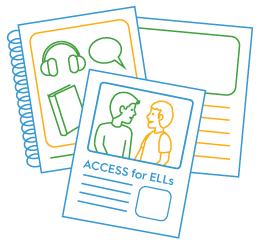Resources/Recursos
Featured Resources



All resources/Todos los recursos
Filter resources by:
Resources/Recursos
Individual Characteristics Questionnaire
Individual Characteristics Questionnaire (ICQ), which is part of WIDA Alternate ACCESS, captures characteristics of students who take Alternate ACCESS. Test Administrators will fill out the ICQ for each student and that information will be reported on the Individual Student Report. ICQ information can help educator teams make program decisions for students. Prior to administering Alternate ACCESS, download and print this example ICQ and use it to consult with Individual Education Plan (IEP) team members about students. Final responses will be entered on the Student Response Booklet.
Resource Details View Download NowReleased June 2025
The Marco ALE de WIDA: A sociocultural approach to the creation of Spanish language arts standards
This WIDA Snapshot introduces the Marco de referencia de las artes del lenguaje del español de WIDA: Aplicación para la actualización y desarrollo de estándares (Marco ALE). The Marco ALE is a Spanish language arts framework and is designed to support the development of Spanish language arts standards specifically for educational settings in the United States.
Resource DetailsReleased May 2025
Tell Us About Your Child Survey
The Tell Us About Your Child Survey is a questionnaire that educators can give to families or caregivers of multilingual learners with the most significant cognitive disabilities to better understand a student's language and communication needs. In the survey, families or caregivers will answer questions about a student’s method of communication and language, their ability to understand communication and their preferred communication supports.
Resource DetailsReleased May 2025
Taking a Genre-Based Approach to Curricular Development Using the Curriculum Amplification Guide
Implementing the WIDA ELD Standards Framework takes time and looks different across different contexts. While some educators are working with different grade-level content curricula, English language specialists may be working with language curricula focusing on a range of proficiency levels. When instructing multilingual learners, it is especially important that curricula strike a balance between content and language. Although it is tempting to start at the lesson level to begin implementation since it feels more manageable to start small, starting at the curricular level is more effective at building a yearlong, cohesive learning experience that builds on current knowledge and experiences and more intentionally towards new understandings and skills. This Focus Bulletin supports educators to take a genre-based approach to making decisions throughout all units of curricula that can both begin and deepen the alignment of the current academic curricula being used to the WIDA ELD Standards Framework.
Resource Details View Download NowReleased May 2025
Strategies for Supporting Multilingual Newcomers
Multilingual newcomers are the fastest growing demographic across U.S. school systems, arriving in K-12 classrooms at increased rates in more and different locations than ever before. These students enter our buildings offering unique cultural and linguistic assets while also possessing distinct academic, social-emotional and linguistic needs. We met to discuss how we can build and strengthen systems that promote multilingual newcomers’ success in classrooms across the consortium! During this webinar, we talk about the latest trends relating to our nation's multilingual newcomers, engage in research-backed approaches centering their learning, and participate in goal setting for future programming with multilingual newcomers and their families in mind.
Resource DetailsReleased April 2025
Pracademics: The Intersection of Teaching and Research
By addressing the intersection of practice and academia, teachers are encouraged to be more involved in implementing evidence-based approaches and becoming more familiar with research informing their classroom practice directly. Engaging in pracademics highlights the work of teacher experiences and promotes the inclusion of practitioners' voices in the field.
Resource DetailsReleased February 2025
Pracademics at the Intersection of Multilingualism, Translanguaging and Transculturalism
This research brief explores the intersection of pracademics, multilingualism, translanguaging and transculturalism. It highlights how pracademics’ unique dual expertise prepares them to face pressing, real-world challenges in the diverse education settings they encounter while addressing nuances of overlapping linguistic and cultural identities. Additionally, it presents diverse voices from the field, highlighting their thoughts on the topic and the impact that pracademics has on their contexts, professional lives and experiences.
Resource DetailsReleased February 2025
Pracademia: La intersección entre la enseñanza y la investigación
Al abordar la intersección de la práctica y la academia, se alienta a los docentes a involucrarse más en la implementación de enfoques basados en evidencia y a familiarizarse más con la investigación que informa directamente sus prácticas en el salón de clase. Participar en la pracademia permite a los docentes resaltar sus experiencias de enseñanza y promueve la inclusión de su voz como pracademico dentro del contexto educativo.
Resource DetailsReleased February 2025
Comprendiendo los descriptores del nivel de desempeño del Marco DALE
Los descriptores del desempeño lingüístico del Marco DALE proporcionan un lineamiento de cómo los y las estudiantes pueden desarrollar su desempeño lingüístico al procesar y producir el lenguaje de acuerdo con los modos de comunicación (interpretativo, expresivo e interactivo).
Resource DetailsReleased February 2025
Understanding the Proficiency Level Descriptors of Marco DALE
Los descriptores del desempeño lingüístico in Marco DALE provide guidance on how bi/multilingual students can develop language that they can interpret, interact and express in each of the communication modes (interpretative, interactive and expressive).
Resource DetailsReleased February 2025
Sample Alternate ACCESS Individual Student Report for Families
This version of the report is for families and provides information about a student’s scores on the Alternate ACCESS English language proficiency test. The report contains the critical information families need to know and can be sent home with students and/or discussed at conferences with parents/guardians.
Resource Details View Download NowReleased February 2025
Action Research: A catalyst for comprehensive teaching and learning in multilingual contexts
This WIDA Snapshot introduces classroom action research – when researchers and educators work together to address classroom challenges – by encouraging teachers to use their researcher voices to make meaningful contributions to the field, whether through collaborative or independent approaches.
Resource DetailsReleased February 2025
Gathering Information: Become an Observer
Language-focused play observations focus on how a child is using language to make meaning and interact with others during play. Educators can use the information gathered from their observations to inform their teaching practices. This is the fourth resource of five intended to support PreK-3 educators to advocate for an incorporate joyful learning with multilingual children in their setting.
Resource Details View Download NowReleased November 2024
Alternate Can Do Descriptors
The Alternate Can Do Descriptors (Alt Can Dos) are the first-ever Can Do Descriptors for multilingual learners with the most significant cognitive disabilities. The Alt Can Dos exemplify what students can do with communication and language at various stages of English language development.
The Alt Can Dos are arranged into the same grade-level clusters (K–2, 3–5, 6–8 and 9–12) as WIDA Alternate ACCESS. Within each grade-level cluster, the Alt Can Dos are organized by interpretive (listening and reading) and expressive (speaking and writing) communication modes for each WIDA ELD Standard and the five levels of English language development.
Resource Details View Download NowReleased October 2024
The Value of Interim English Language Proficiency Assessment Data
In this recorded webinar, Mark Chapman, senior assessment innovation manager at WIDA, discusses the value of interim English language proficiency data and how WIDA's interim assessment, WIDA MODEL, can be used to support instruction for multilingual learners.
Resource DetailsReleased October 2024
Introducing WIDA Screener for Kindergarten
This WIDA Screener for Kindergarten eSummit session recording provides an in depth look at the test.
Resource DetailsReleased October 2024
Marco DALE Digital Explorer
This website serves as a digital database of the Marco de los estándares del desarrollo auténtico del lenguaje español de WIDA (Marco DALE). It categorizes Language Expectations in two ways: by the Marco DALE standard statement and grade-level clusters, and by the Key Language Use and communication mode. Proficiency Level Descriptors (PLDs) can be explored by grade level (K-1 and 2-12) and communication mode.
Resource DetailsReleased September 2024
Sample School Community Assets and Interests Survey
PreK-3 educators can use this tool when planning to connect with families about their communities, family assets and interests.
Resource Details View Download NowReleased July 2024
Shifting Mindsets Reflection Tool
PreK-3 educators can use this tool to reflect on their mindsets and how those mindsets can positively impact transition practices with multilingual children and their families.
Resource Details View Download NowReleased June 2024
Trauma Informed Considerations for Multilingual Learners
As teachers, staff and administrators in school buildings, district offices and educational agencies across the country, we play a critical role in responding to the individual needs of students in our teaching and learning settings. Trauma can be experienced by any student, but for those who are also learning English as an additional language or who are adjusting to a new culture, these experiences add another dimension of care to be addressed by educators. Through this focus bulletin, readers will be introduced to a research based guide for working with multilingual learners who may benefit from trauma informed practices, including discussions on special populations, the sharing of empowering and engaging strategies, a raising of awareness about prompting adverse behaviors, and building rapport across whole school, student and family networks.
Resource Details View Download NowReleased May 2024




